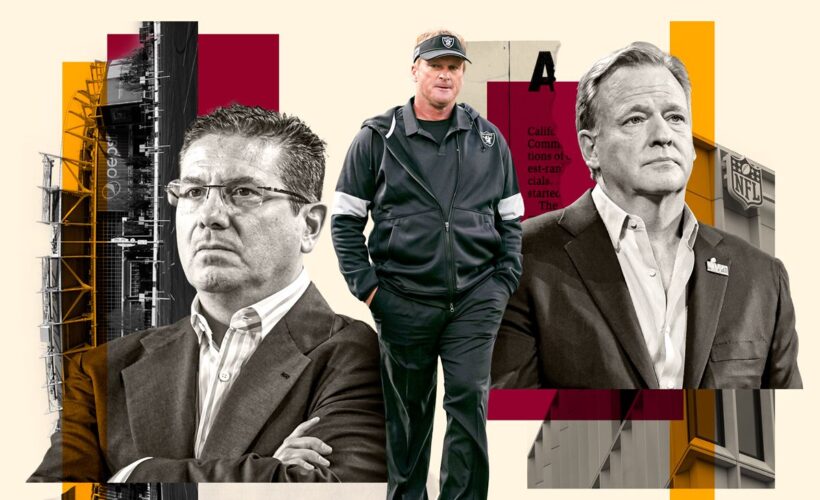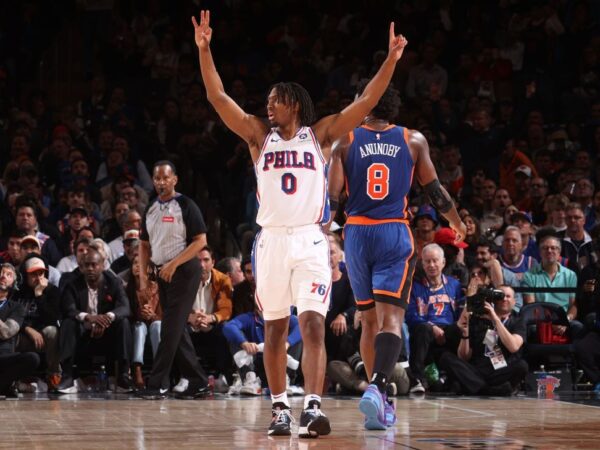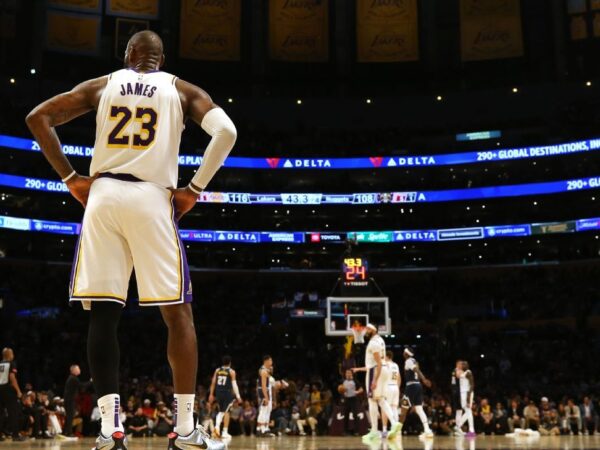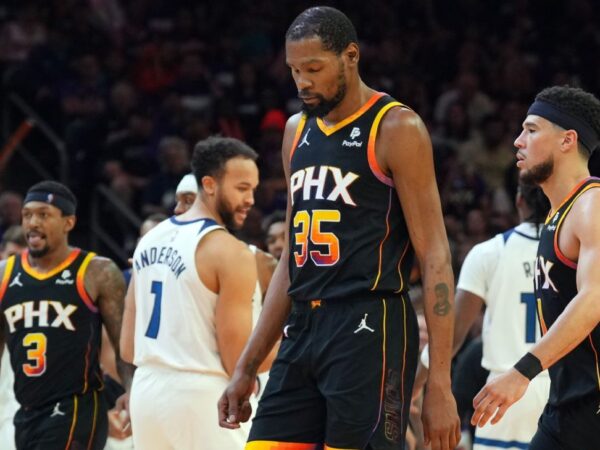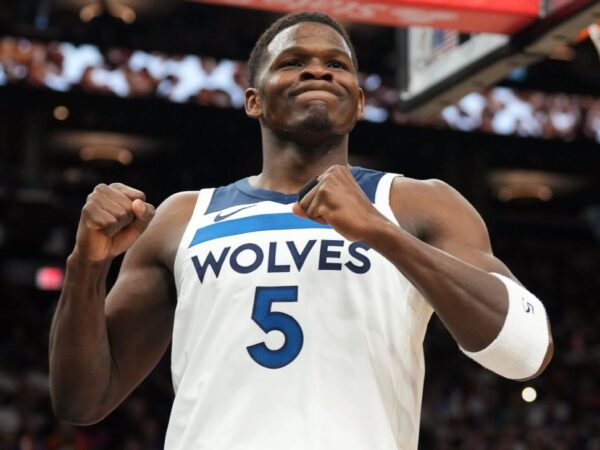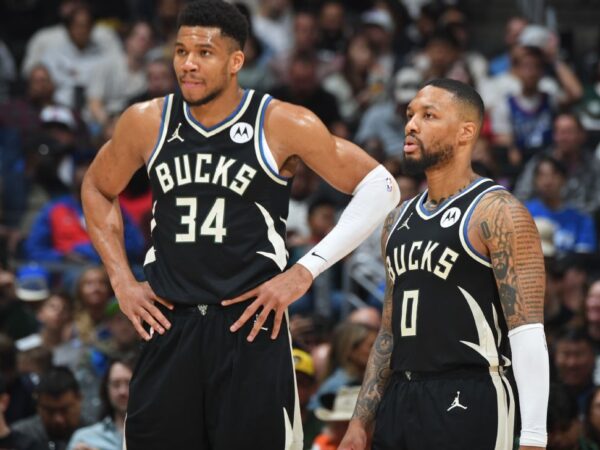AS HE HOPPED on a call with Roger Goodell, Las Vegas Raiders owner Mark Davis had no plans to fire his head coach.
It was the afternoon of Friday, Oct. 8, 2021. A few hours earlier, The Wall Street Journal had published a blockbuster story about an email Raiders coach Jon Gruden had sent 10 years earlier, when he worked as a color analyst for ESPN’s “Monday Night Football.” Gruden, in an exchange with Washington’s general manager Bruce Allen, had called NFLPA executive director DeMaurice Smith “Dumboriss” and described him using a racist trope. To most observers, Gruden’s dismissal seemed like a matter of when, not if. But Davis hoped to — at the very least — slow down a hurricane from the center of the storm.
According to sources familiar with his thinking, Davis found the story’s timing suspicious. Why were emails coming out now? Who had leaked them? And who had the most to gain?
“It felt like a setup,” Davis would later tell an associate.
Even though league officials in New York and a few team owners had known about the Gruden emails for months, as part of the investigation into Commanders owner Dan Snyder and the toxic workplace culture inside his franchise, Davis had learned of them only the day before the Journal’s exclusive, when Raiders president Dan Ventrelle told him: “We’ve got a problem.”
After the Journal story, Davis polled current and former Raiders players and staff on how they felt about Gruden. Some wanted him gone; others didn’t. Davis knew Gruden could be crass and profane, the sources said, but in a relationship spanning more than two decades, he had no reason to believe Gruden was racist.
So when Davis and Ventrelle took the conference call with Goodell and NFL general counsel Jeff Pash, Davis leaned toward sticking by Gruden. But Davis felt immediate pressure. According to sources with direct knowledge of the call, Goodell repeatedly told Davis, “You have to do something.”
“What are you going to do?” Pash asked.
The statements and questions incensed Davis. He believed the league office had no purview to pressure an owner to fire a head coach, regardless of the circumstance.
“There’s more emails coming,” Goodell told Davis. “Something has to be done.”
When the call ended, Davis turned to Ventrelle.
“Motherf—er,” Davis said in exasperation.
On Monday, Oct. 11, The New York Times published a story revealing new emails in which Gruden wrote that Goodell was “clueless” and “anti-football” and described him in anti-gay and misogynistic terms. That evening, Gruden resigned, pushed by Davis. Gruden would soon file a lawsuit against the NFL and Goodell that accused the commissioner of “directly leaking” his emails to harm his reputation and force him out, something league officials have repeatedly denied.
What angered Davis more than anything, he later said, was being surprised by the emails months after Goodell, Pash and other owners, including Snyder, knew about them. It seemed to Davis as if he and the Raiders were collateral damage in what he saw as Goodell’s yearslong effort to protect Dan Snyder, of all owners, at all costs.
“F— the NFL,” Davis later told Gruden. “And f— Dan Snyder.”
‘A major miscalculation’
FIFTEEN DAYS AFTER Gruden resigned under pressure, Goodell denied in a closed-door, owners-only meeting in midtown Manhattan that he or anyone in the league office had leaked the damning emails. The focus of speculation around the league turned to Snyder. In October 2022, ESPN reported that the league believed Snyder was behind the leaks. A congressional report last December contained testimony that also pointed toward the Commanders as the source of the leak.
Months of interviews with executives, lawyers, agents, and league and team officials, most of whom requested anonymity, reveal that a larger cast of people might have played a role in the leaking. Those accused by the sources include:
-
Top NFL executives, including Goodell. Sources, including one in ownership, told ESPN that NFL executives approved the release of some emails. Four owners told ESPN they believe Goodell was personally involved. NFL spokesperson Brian McCarthy repeated the league’s denial, in public and in legal responses, that it was responsible. “Neither the NFL nor the commissioner leaked Coach Gruden’s offensive emails,” McCarthy told ESPN. In a statement to ESPN, Gruden said, “it’s ridiculous the league thought they could cherry-pick emails from years ago, when I wasn’t even a coach and try to end my career.” He added: “At a minimum, I deserved the opportunity to respond and receive some due process.”
-
NFL Players Association chief DeMaurice Smith. Smith bragged that he was responsible for leaking the racist email referring to him, an associate with direct knowledge told ESPN. The leaked email was published on the same day Smith faced a union vote to retain his job. Smith declined to comment through union spokesperson George Atallah.
-
Snyder, in an operation run by his New York law firm Reed Smith and with help from Desiree Perez, the CEO of Roc Nation, which has a $25 million contract to help the NFL on social justice issues. A Reed Smith lawyer told one source, before and after the leaks, about the firm’s involvement and Perez’s alleged role, which the source did not define. Lawyers with direct knowledge of Reed Smith operations and Perez’s dual role — as an influential NFL consultant and a Snyder confidant — told ESPN the group dusted off tactics it had used in Alex Rodriguez’s lawsuit against Major League Baseball years ago.
But Jordan Siev, a partner at Reed Smith, said that the firm “never leaked any” of the emails and that “neither Dan Snyder nor anyone on his or the team’s behalf ever requested or authorized that Reed Smith do so. Any assertion to the contrary is false.” Perez declined repeated opportunities to speak with an ESPN reporter. An attorney representing her said in a letter to an ESPN attorney that “Ms. Perez had no role whatsoever in the leaking of any emails, or in any discussion or decision to leak any emails.”
Sources said Snyder, who was serving a punishment after a league investigation had exposed a toxic workplace culture at the team, hoped the emails would deflect blame for workplace issues to Allen while currying favor with Goodell by giving the commissioner a chance to eliminate Gruden, a longtime antagonist. Commanders spokesperson Jean Medina declined to answer any questions about the leaks but issued a statement that “ownership is working constructively with the League to finalize the sale of the Washington Commanders to the Josh Harris Group and will continue to support the organization through the transition process.”
The actual leakers’ identities remain unknown as lawyers and executives point to each other like a circular firing squad, with plenty of smoke but no smoking gun. Everyone who knew about the emails had apparent motives to leak.
No matter how the leaks were engineered, multiple sources draw a direct line from emails that trickled out over a few days in October 2021 to Snyder’s crash and his imminent $6.05 billion sale of the Commanders. Within days of the leaks, a congressional committee launched a wide-ranging investigation of the Commanders and the NFL that forced Goodell, Allen and Snyder to testify under oath. The congressional inquiry would lead to a federal criminal investigation into alleged financial misconduct by Snyder and the team. As pressure mounted, Snyder bragged to associates that he had collected dirt on his fellow owners and Goodell that could “blow up” the league. Unfazed, owners finally all but forced Snyder to sell his beloved franchise.
Although multiple people paid a price — or still could — for a series of leaks that continue to threaten the NFL in the Nevada courts, no one suffered greater blowback than Snyder.
“He was free and clear that October — he just had to wait out his suspension and let everything blow over,” a source close to Snyder said. “A major miscalculation. Without the leaks, he might just have survived.”
‘Dictating his punishment’
IN JUNE 2021, Dan Snyder’s legal team and select league executives gathered at NFL headquarters in Manhattan. In survival mode, Snyder’s team of lawyers prepared a defense against the findings from attorney Beth Wilkinson’s investigation into the franchise. The previous summer, he had hired Wilkinson to look into the team, a move to keep the league office at arm’s distance. But the league quickly had assumed control of Wilkinson’s inquiry and quietly struck an accord with Snyder’s team — “a common interest agreement” that the owner and the league would share all evidence and material collected and that neither the NFL nor Snyder would release any information from the inquiry without the other’s consent.
Although it appeared to owners and executives that the league and Snyder had worked together to minimize the investigation’s impact, palpable tension existed. In league circles, Goodell appeared to be growing weary of Snyder. During the pandemic, it became a running joke among some owners and executives that when Snyder spoke on videoconference calls, Goodell looked irritated or distracted. But now, Snyder moved beyond simply annoying the league office to causing serious problems.
When Snyder’s lawyers — famed defense attorney Joe Tacopina, assisted by Reed Smith partners Siev and James McCarroll — began to show a series of slides, those in the room were stunned, according to sources. What was presented was not a defense against any of Wilkinson’s findings made against Snyder; it was a series of screenshots of potentially embarrassing emails and texts from several top league executives, including Goodell’s top lieutenant, Pash. The rationale, according to a source with firsthand knowledge, was to argue the hypocrisy of league officials judging Snyder. The tactics were so ruthless that some attorneys felt uncomfortable. Although none of the content was sexist, anti-gay or graphic, the signal was clear: If Goodell didn’t do what Snyder wanted in terms of handling the Wilkinson report and punishment, these emails and texts would be leaked.
It became known in league circles as the “Blackmail PowerPoint.”
League executives and others involved in the case were angry when they were informed of Snyder’s tactics, multiple sources told ESPN. From that point on, any direct communication from the league office to Snyder had to be legally vetted. But Snyder’s PowerPoint proved effective. A few top NFL executives had persuaded Goodell to give Snyder a stiff and lengthy punishment. But as the time for announcing Snyder’s punishment neared, Goodell began to reconsider.
By late June, Snyder was “dictating his punishment” down to every detail, according to a source with knowledge of the deliberations. Legal sources said that Snyder and his lawyers were consulted by NFL executives in the drafting of the news release, with Snyder weighing in on word choices. It was an atypical and collaborative process, as compared with the way the league typically metes out punishment — notably in the one-sided judgments after Bountygate and Deflategate. Snyder and his team were pleased with the results, later bragging that the discipline was surprisingly light.
In the late afternoon of Thursday, July 1, before holiday weekend, the league announced Snyder’s punishment. He would step away from day-to-day operations “for at least the next several months” and pay a $10 million fine — with proceeds benefiting Washington, D.C., area nonprofit organizations. The word “suspension” was never used. In a news release, the NFL praised Snyder for having “recognized the need for change” and “undertaken important steps” to improve the team’s culture. None of Wilkinson’s specific findings were released, despite assurances she had given witnesses, including former team cheerleaders, that the full report would be public. The drafted recommendations urging the NFL to force Snyder to sell his team had effectively been buried. A Washington radio station reported that it had obtained screenshots of the recommendations from Wilkinson’s draft report that included urging the NFL to force Snyder to sell his team. But the NFL insists no written document ever existed.
Her work now complete, Wilkinson turned an estimated 650,000 Commanders emails over to the league. A handful of senior league executives oversaw IT consultants who culled Gruden’s offensive emails. Apart from Snyder’s lawyers at Reed Smith, only a handful of league staff, mostly in the legal department, had access to the emails. For months after that, sources said, the emails were the source of gossip among owners and executives — until summaries of the emails were shown to Roger Goodell in early October.
‘We need your help’
LONG BEFORE ANY leaked emails, the NFL enlisted Jay-Z’s entertainment company, Roc Nation, to help solve a big problem. The league in 2018 remained on defense from the fallout of then-President Donald Trump targeting the NFL over former 49ers quarterback Colin Kaepernick and a small group of players kneeling in protest during the national anthem. The silent protest of police brutality and the political reaction to it contributed to eroding TV ratings and strained relationships with sponsors. Goodell had lengthy discussions with various groups of players about systemic racism and social justice, but the NFL was now struggling to find ways to be proactive. New England Patriots owner Robert Kraft, among other owners, thought the league needed outside help. Kraft consulted Jay-Z, who had called out the NFL after ESPN reported that then-Texans owner Bob McNair had said of players in a closed-door meeting: “We can’t have the inmates running the prison.”
According to sources, Kraft told Jay-Z, “The NFL isn’t picking up on these social issues. We need your help.”
Kraft connected Jay-Z and Roc Nation to Goodell. Soon, sources told ESPN, the league partnered with Roc Nation in a $25 million, five-year deal to reshape the Super Bowl halftime show, produce music tied to the season, amplify the league’s social justice agenda and, perhaps most importantly, move beyond the controversy around teams’ unwillingness to sign Kaepernick. At an August 2019 news conference at NFL headquarters announcing Roc Nation’s partnership with the league, Jay-Z told reporters, with Goodell sitting nearby, “I think we’ve moved past kneeling.”
Top league executives and at least a few owners believe the alliance has worked, beyond the more than $250 million the league has raised to commit toward social justice causes. Executives believe that Roc Nation has raised the bar with Super Bowl halftime shows the past few years. The affiliation with Jay-Z has helped the NFL improve its image on race with fans, according to an executive outside the NFL with knowledge of the league’s internal data.
The partnership also gave Perez, the Roc Nation CEO, an open door to the league office. Perez had overcome a criminal past to build a reputation as one of entertainment’s most powerful executives. In 1994, she had been arrested for conspiracy to distribute cocaine, later working as a DEA informant and serving nine months in prison for a probation violation. She was among the dozens of convicted felons Trump pardoned a day before he left office.
Some in the league office believed Roc Nation had essentially appointed itself as the league’s marketing arm. And some league officials believed Roc Nation employees treated NFL staff dismissively, angering those who sincerely wanted to help find solutions to the league’s social justice problem.
Goodell refused to back his staff when tension arose between the league and Roc Nation in 2020, instead telling his charges to just work it out. Roc Nation owned all the leverage. The NFL couldn’t afford to suffer a fallout with Jay-Z, not after the Kaepernick controversy, and not after how much it had publicized their partnership. Plus, Goodell seemed to appreciate and trust Perez, inviting her to key meetings, an action that mystified some owners and executives. “The NFL became afraid of Roc,” said a former NFL official, who adds that the partnership has been “a mess.”
Perez became a trusted confidant to Dan and Tanya Snyder and, according to a letter from a team lawyer to ESPN last December, sits on the board of the Commanders. Jason Wright, the first Black team president in NFL history for Washington in 2020, hired Greg Resh, a former Roc Nation chief financial officer, to be his CFO and, eventually, chief operating officer. Roc Nation and Snyder are both clients of Reed Smith, a firm with a reputation for taking an aggressive approach on behalf of famous clients. Previously, Perez and Reed Smith were allegedly involved in leaking documents to reporters and putting private investigators on now-MLB commissioner Rob Manfred to help Rodriguez’s lawsuit against Major League Baseball.
Reed Smith’s brass-knuckles reputation appealed to Dan Snyder, who in the fall of 2021 was impatient to return to his team.
Snyder believed that his banishment was supposed to last only a month and that he should have been able to return to normal, sources said. He attended every game during his vague banishment, even if he wasn’t seen on the field as usual. As the 2021 regular season neared its midpoint, Snyder considered his punishment served and expected a full return to visibility and attendance at league meetings.
“He didn’t think that was part of the terms he had worked out,” a source close to Snyder said.
ESPN later reported that Snyder’s lawyer, John Brownlee of Holland & Knight, believed that Snyder’s punishment was over as of Nov. 1, 2021. But Goodell refused to allow him back to league meetings. If Snyder could have lain low until the end of the season, owners and executives told ESPN, he might just have retained his team.
But Snyder couldn’t resist. Sources said they were told Snyder and the NFL saw opportunity in publicizing racist and anti-gay emails from one of the league’s most prominent head coaches.
The hope, one source said, was that the leaks would “divert attention from this situation with Snyder and give room for everybody to lay down their swords. … This was a hatchet job — a gift wrapped by Snyder for Goodell, to get back into Goodell’s good graces on the suspension.”
The source was told by an attorney involved that Perez, meanwhile, saw the chance to help the commissioner: “Goodell and the league wanted to off Gruden and seem like they were tough on racism.
“This was a gift.”
‘Don’t go with this story’
EARLY IN THE week of Oct. 4, senior league executives provided summaries of some of the worst Gruden emails to Goodell. Senior league sources insisted that the emails shared with Goodell were to remain confidential.
That plan lasted until late Thursday afternoon, Oct. 7. Gruden was walking off the practice field when he got a call from Davis that The Wall Street Journal had obtained one email he had sent a decade earlier. Gruden immediately called his longtime agent, Bob LaMonte. “He could barely talk,” LaMonte recalled. LaMonte then called Andrew Beaton, the Journal reporter. “Have you talked to Jon?” LaMonte said he asked Beaton. The answer was not yet. “You should talk to Jon.”
Gruden immediately assumed the league was responsible for the leak, a final “blackballing” by Goodell, he told associates.
The Gruden email disparaging Smith in racist terms was about to be published within a few days of Goodell’s review — a coincidence that was hard to miss, league officials privately acknowledged. League sources declined to say whether Goodell had shared the emails with anyone.
Raiders officials called the league office, trying to understand what had happened. The league immediately sent 11 of Gruden’s emails to the Raiders for review, in care of Dan Ventrelle, then the team president and general counsel, the sources said.
Later Thursday night, Beaton called Gruden, who was out to dinner with his wife, Cindy, in the Southern Highlands neighborhood of Las Vegas.
Gruden told an associate he pleaded with Beaton, “Don’t go with this story. … You are going to destroy people’s lives,” and Beaton replied, “This is the tip of the iceberg.”
Also on Thursday, Goodell gave Smith a heads-up that a Journal reporter had the Gruden email about him, a league source said.
On Friday afternoon, Oct. 8, the Journal published its story, and Gruden instantly became the face of racism in the NFL. Race was a subtext of Smith’s 14-year tenure — players elected retired business executive Lloyd Howell to replace Smith on June 28 — as he was often the only Black man in the room while negotiating against mostly white owners and executives.
At the time, the NFL reacted to the leak without acknowledging that it had prior knowledge of the emails or that there were any league communications with the Raiders or Smith. “The email from Jon Gruden denigrating DeMaurice Smith is appalling, abhorrent and wholly contrary to the NFL’s values,” McCarthy, the league spokesperson, said in a statement.
The leak came just as Smith was in danger of being voted out of his job by team player representatives. A committee vote on his future ended in a 7-7 tie, triggering a full vote of player reps. For years, Smith had faced stiff criticism among members over the perception that the league had outmaneuvered him on two consecutive collective bargaining agreements. Owners and league executives viewed him as an asset — and wanted him to continue as executive director. Goodell and Smith also have become closer in the past few years since they found a way to have a season played during the pandemic. An owner told an associate that the league hoped the emails would help Smith survive.
A lawyer who frequently works with the league said the timing of the leak was “suspicious because clearly it appeared to anyone paying attention that someone was trying to help De. Who had the incentive for De to keep his job? The NFL.”
Within hours of the Journal story, Smith was reelected as NFLPA executive director to a fifth term — by a single vote. Smith later bragged that the leak had worked, a source told ESPN.
The Journal’s scoop shook the league, with owners and executives wondering who was responsible for the leak and pointing fingers. Bruce Allen, from his home in Arizona, called the league office to complain that his email with Gruden had been leaked. Senior vice president and special counsel for investigations Lisa Friel told Allen that Snyder’s team had leaked. “We didn’t do it at the league office,” Friel told Allen, as he would later testify before Congress. “It came out of their side.”
A source who spoke to Pash, the NFL’s general counsel, on the day of the Journal story said he “was furious about the leak” and insisted it had not come from the league office. Pash, who declined an interview request through a league spokesperson, told the source he believed it had come “from Snyder’s law firm and Desiree Perez.”
Later that day, the NFL shared server access to thousands more emails with the Raiders, a league source said. The source said that only the NFL, key Washington officials and, by that point, the Raiders had access to the server.
At The New York Times, veteran NFL reporter Ken Belson was covering Smith’s reelection bid when the Journal’s story dropped. He went to work trying to find more emails. It was the same afternoon that Goodell told Davis on the conference call that more emails were coming. Three days later, Belson would drop a scoop — co-bylined by Metro section reporter Katherine Rosman — that revealed a new batch of Gruden emails. Some of them were not among the 11 emails shared with the Raiders by the NFL, suggesting another source provided them to the Times, a league source said. A Times spokesperson said that, “as a matter of policy, The New York Times does not discuss its sourcing.”
Despite a furious outcry against Gruden on social media, and Davis believing that the league was tacitly pressuring him to dismiss Gruden, by Friday night the coach believed he would survive. He addressed the team. As he reread his old emails, he thought some were funny — “email chains where six or seven guys are trying to make each other laugh saying stupid s—” — excluding the racist trope he had used to describe Smith. The coach believed the organization knew who he was, at heart. Davis seemed to agree.
Both men were unaware that another bomb was about to drop — in another story containing leaked emails.
‘We’ve got a problem’
ON SUNDAY AFTERNOON, Oct. 10, Gruden was back on the Raiders’ sideline, coaching the team to its second straight loss, this time to the Bears 20-9. The coach’s emails overshadowed the game, but he still believed his self-inflicted wounds were survivable. By the next night, when he spoke to Davis, the tone had shifted.
“I got an email from The New York Times,” Davis said. A story was being prepared about Gruden’s anti-gay emails about Goodell. Davis told friends he had now been backed into a corner. He wasn’t just the owner of the Raiders, who had defensive end Carl Nassib, the first active NFL player to come out as gay, on its roster; Davis also owned the WNBA’s Las Vegas Aces, with lesbian players, staff and fans.
“We’ve got a problem,” Davis told Gruden.
Gruden knew it was over. He resigned, ending a 27-year coaching career in disgrace. Later, he reached an undisclosed settlement with the team for the remaining seven years of his 10-year, $100 million contract.
Back in Manhattan, the scandal seemed far from over. Yet more emails were coming out in the Times, this time also targeting Pash — some of the same emails Snyder’s lawyers had shared with league officials during their June PowerPoint presentation. On Thursday, Oct. 14, the Times published another story detailing friendly and casual emails between Pash and Allen, a story people close to Snyder told ESPN was intended to pin the team’s toxic culture problems on Allen and show that the league was complicit and cozy with him. “Dan wanted to kill Pash,” an ownership source with knowledge of the leaks told ESPN.
Over the years, Goodell has responded to leaks from inside the league office by assembling his top staff and saying the league would be searching its phones and computers for communications with reporters. But after the Gruden leaks, league sources said, Goodell didn’t hold that type of meeting; it’s unclear why not.
Lawyers close to the NFL and to Gruden said the choice to leak to the Times over The Washington Post, a newspaper Snyder hates, was a dead giveaway that Snyder and those around him were behind the leaks. Two sources told ESPN that the same “playbook” that was used in the A-Rod lawsuit against MLB was used to leak the emails published by the Times.
“The same crew that helped Alex go after Manfred helped Snyder with the leaks,” said another source who was briefed on how the Gruden leaks were engineered.
Gruden’s legal team went as far as to research prior work by the reporters who received the leaks and found what it saw as favorable stories previously written about Dan and Tanya Snyder and Roc Nation. The Times‘ Rosman wrote a piece in February 2020 about Roc Nation’s partnership with the NFL. The Journal’s Beaton wrote in June 2021 about Dan and Tanya Snyder’s efforts to reform the team’s culture, including a rare on-the-record interview with Dan Snyder. The Wall Street Journal declined to comment.
“How stupid can you be?” said a source close to Snyder who was aware of the previous stories done by the reporters who reported on the leaked emails. “They left a trail in the dirt.”
But another source who knows Perez disputed her involvement. The source said she had no reason to help Snyder and had distanced herself from him during her time on the Commanders’ board. And Perez “had no knowledge that it [leaking] was even being contemplated,” her attorney wrote to ESPN’s counsel.
After Gruden was gone, Snyder had hoped to be welcomed back into the league for good. But his plan backfired. Goodell still refused to allow Snyder to attend league meetings.
In fact, the league said in its response to Gruden’s lawsuit, the commissioner had no vendetta against Gruden and the email leak “was unequivocally against the NFL’s best interests.”
“The emails not only dampened the NFL’s historic season, but also stood in stark contrast with the significant progress the League had made in recent years on diversity, equity and inclusion initiatives, and resulted in negative media coverage for the League,” the NFL filing says.
Within days of the leaks, Congress opened an investigation into Snyder, the allegations of sexual harassment and financial improprieties, and into Goodell’s handling of the Wilkinson investigation. A source close to the committee told ESPN that, although congressional staff and some lawmakers were already interested in issues around the Commanders and Snyder, the string of leaks moved them to act. Their thinking was, if the leaks showed the kind of material Snyder was weaponizing against his enemies, what else might be out there?
The congressional inquiry thrust the Snyder allegations that had been dormant since July back into the spotlight. In February 2022, several former Washington employees spoke at a congressional roundtable, and one woman, Tiffani Johnston, alleged she had been sexually harassed by Snyder at a team dinner. That revelation caused the NFL to hire Mary Jo White, the former U.S. attorney and head of the Securities and Exchange Commission, to conduct a new inquiry of Snyder. White’s report, the findings of which Goodell has pledged repeatedly to release publicly, is expected soon. In June 2022, Goodell testified but Snyder evaded testimony and cruised the Mediterranean on his superyacht. Snyder and Allen also testified under oath before the committee.
A month after his departure, Gruden filed a lawsuit against the NFL, naming Goodell as a defendant and arguing that the league sought to ruin his career by greenlighting the leaked emails, an act LaMonte calls “disgraceful” and “the worst hit job that I’ve ever seen.”
“For the league to exist, it has to be neutral,” said Gruden’s attorney, Adam Hosmer-Henner. “If it favors or disfavors owners, teams or coaches, then all bets are off with respect to civil liability, antitrust protection and competitive integrity. The league was not neutral or fair with Jon, and our lawsuit is proving there are consequences.”
Gruden’s enemies list
GRUDEN HAD HIS reasons to believe Goodell and the league office had it out for him. The reasons were planted by Al Davis, who taught Gruden to hate the NFL office from the moment he hired the coach in 1998, eight years before Goodell became commissioner. Davis often told Gruden that the executives at 345 Park Avenue played favorites — classic Raiders paranoia. But it also stemmed from Davis suing the league for antitrust violations. Davis also was convinced that commissioner Pete Rozelle had personally killed a trade before the 1983 draft that would have sent John Elway to the Raiders, refusing to allow a generational quarterback to play for a renegade franchise.
But after becoming one of the game’s best and most celebrated coaches, Gruden saw examples that the old man was right. How else to explain the since-eliminated Tuck Rule — a rule Gruden had never heard of before — that led to a Patriots playoff victory at the Raiders’ expense in 2002? As the years passed, and Gruden won a Super Bowl with the Tampa Bay Buccaneers and eventually moved to the “Monday Night Football” booth in 2009, his hatred of the league office grew. In 2011, Gruden was in an especially bad headspace, he later told friends, furious over the owners’ lockout that offseason and that clubs had voted in 2009 to give teams the option to eliminate pension plans for assistant coaches and other employees.
His frustration came to a boil during a December 2011 Monday night game between the Falcons and the Saints. Atlanta linebacker Curtis Lofton delivered a helmet-to-helmet hit on receiver Marques Colston over the middle and was flagged for unnecessary roughness. To a national TV audience, Gruden stated his displeasure with the call. “I just don’t understand how games are being officiated,” Gruden said after a play on the next possession.
Gruden’s commentary earned him a call from the league’s Park Avenue headquarters. Over the phone, Goodell asked Gruden to come to the league office to meet with John Madden and Jeff Fisher. The purpose, as the commissioner explained, was for Gruden to get a lesson on player safety.
“You’ve got to be s—ting me,” Gruden told Goodell.
Gruden wondered whether it was a joke, he later told associates. He needed a player safety lesson from Madden and Fisher, two coaches whose players had delivered some of the ugliest hits in NFL history? Gruden later told friends he felt that Goodell was treating him like a “stooge” who had “never coached in the league, like I don’t study football day in and day out … like I didn’t know a damn thing about player safety.”
Gruden never went to the league office for that meeting. The only time he ever met Goodell was years later, when he went to the league office to promote youth football, one of Gruden’s passions. He expected to sit down with Goodell and plan a way to increase participation rates. Instead, Gruden met with an assistant of the commissioner. At the end of the session, Goodell entered a conference room, thanked Gruden for coming and left. Gruden fumed; after that brief meeting, Gruden never spoke again with Goodell.
Gruden burned with suspicion when Mark Davis was elbowed out of the three-team derby to relocate to Los Angeles in 2016 despite owning the most popular team in the market by far. Those feelings intensified in 2020 when Gruden was in his third year back as the Raiders’ head coach. The league fined the Raiders $500,000, fined Gruden $150,000 and stripped the team of a sixth-round draft pick for COVID-19 violations — and that was after the league had fined the team and Gruden a total of $350,000 for violations earlier in the season. (Davis offered to pay Gruden’s $150,000 fine, but league officials insisted Gruden pay it personally, which he did.) Livid, Gruden appealed the fines but ended up writing the checks. After he did, his friend Sean Payton, then the Saints’ coach and who also had been fined for COVID-19 violations, called him and laughed.
“I never paid the fine,” Payton told Gruden, adding that other coaches also refused to pay. “You’re the only dumbf— that paid the fine.”
Gruden continued coaching, disenchanted by what he saw as incompetence and overreach from NFL headquarters, from poor and inconsistent officiating to league office executives pressuring him to hire diverse coaches. Like many coaches, Gruden believed there was a massive disconnect between the dictates of 345 Park Avenue and the way the game is played on the field. In quiet moments, Gruden had designs on one day becoming commissioner. But at heart he knew he was a coach, and he never gave much thought to the offensive language that cost him his job. He knows he’ll probably never be a head coach again; he’s consulting now for the Saints, helping tutor veteran quarterback Derek Carr.
Gruden recently wondered aloud to associates why Dan Snyder would have had it out for him. He knew that Snyder hated Bruce Allen; Snyder had fired Allen in 2019, and the two were fighting over whether Snyder needed to pay the remainder of Allen’s contract, sources said. And Gruden knew his brother Jay had shared some unsavory stories earlier in 2021 about working for Snyder, including telling the Post that the owner would “come in off his yacht” and pick players on the first day of the draft and override his coaches, scouts, everyone. Gruden thought back to an exchange with Snyder years earlier, when he had bumped into Snyder at a restaurant. Gruden believed Snyder was drunk, and he and Gruden started playfully trash-talking, with Snyder calling Gruden fat and Gruden saying he might “dribble his head into the asphalt.” Both men laughed, but Gruden wondered if Snyder had taken offense.
Although the league initially expressed confidence that Gruden’s lawsuit would be dismissed, Gruden has won every court motion against the NFL. The league has tried to move the case to arbitration, its venue of choice, where league-friendly lawyers are in charge and discovery, including communications between league officials and others, is not made public. Gruden’s case is now on appeal by the NFL before the Nevada Supreme Court. A ruling is expected late this year.
League officials told ESPN that regardless of any bad blood between Goodell and Gruden, the commissioner wouldn’t have approved leaking the emails, despite their racist tone. “He still wouldn’t do it,” a league source said. In NFL circles, it’s believed that if not for the leaks, those emails would have remained buried in what owners and executives commonly refer to as “Jeff Pash’s black box.”
Gruden persists in believing that Goodell “pushed the code red” against him, he told associates, adding that the commissioner executed the “kill shot” on his career, “a bullet to the head.” Gruden insists he won’t settle his lawsuit for any amount, intending “to burn the house down” to reveal the truth about who ordered the leaks. “This was a massive hit job,” Gruden recently told an associate, often saying Allen had told him the 650,000 emails “incriminate everyone in the league.”
“Why would these people want to come and get me?” The only explanation, he said, is that he had led a leaguewide whispering campaign of “F— Roger Goodell. And I’m not the only one, by the way. … Deep down, I knew he — Goodell — had me by the balls.”
The way things go
IN LATE MAY 2023, in a suburban Twin Cities hotel, Mark Davis and Roger Goodell head to league meetings. Goodell enters early. Davis is behind, one of the last owners to enter the closed-door session. For the third straight year, Snyder is not present, but for the third straight year, his presence hovers over the proceedings. The sale of the Commanders to Harris isn’t complete, but owners are making clear that it’s a matter of when, not if. In the hotel lobby, Jerry Jones is telling reporters the sale will get done because owners want it to get done.
Privately, owners still expect Snyder to fight until the sale is complete, as he has all along. Sources said that in October 2022 — a full year after the email leak and days after the ESPN report that he had threatened to “blow up” the league and Goodell with “dirt” he had collected — word spread that Snyder planned to show up at owners meetings in lower Manhattan. Goodell insisted that he still was not allowed to do so despite the vague terms of his punishment. Owners enlisted Jones, the only one of them with influence over Snyder, to implore Snyder not to attend. The next day, the Colts’ Jim Irsay told reporters that his fellow owners needed to look into removing Snyder, based on his behavior. Two weeks later, Snyder announced that he was exploring a sale of the team, expected to be approved by owners July 20.
As Davis enters the 2023 spring meeting, he smiles, pleased to be here, as usual. It’s been a tough time since Gruden resigned. The Raiders made the playoffs in 2021 but are 13-18 overall since the emails were leaked. The team is now in the midst of another rebuild and in search of a new franchise quarterback, a reminder of how fragile success is in the NFL. Davis recently brought on a new limited partner: Tom Brady. And despite the league and owners awarding Las Vegas the draft in 2022 and Super Bowl LVIII next February, Davis is still seething over the way he was treated by Goodell, especially compared with how the commissioner treated Snyder. In Goodell’s NFL, almost always, the commissioner grants an owner far greater leniency than any head coach or star player. But even the owners aren’t treated equally. Davis knows it’s the way things go for his family, and for the Raiders.
And as the owners in that exclusive room yearn to finally push the league to a post-Snyder world, for this moment Dan Snyder is still one of them.
ESPN senior writer Tisha Thompson and researcher John Mastroberardino contributed to this report.
Seth Wickersham and Don Van Natta Jr. are senior writers for ESPN. Reach them at [email protected] and [email protected]. On Twitter, find them at @sethwickersham and @DVNJr.
Source:ESPN

